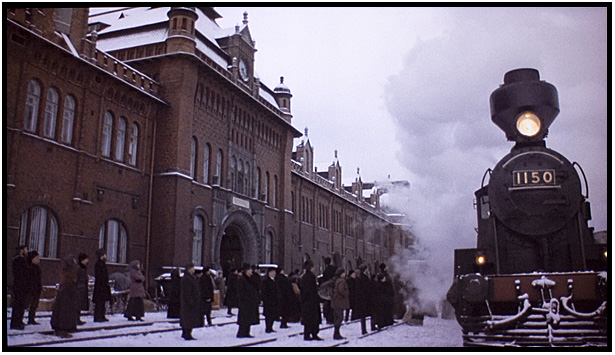REDS
(director/writer: Warren Beatty; screenwriters: Trevor Griffiths/from the book “Ten Days That Shook the World” by John Reed; cinematographer: Vittorio Storaro; editors: Dede Allen/Craig McKay; music: Stephen Sondheim/Dave Grusin; cast: Warren Beatty (John ‘Jack’ Reed), Diane Keaton (Louise Bryant), Edward Herrmann (Max Eastman), Jerzy Kosinski (Grigory Zinoviev), Jack Nicholson (Eugene O’Neill), Paul Sorvino (Louis Fraina), Maureen Stapleton (Emma Goldman), Nicolas Coster (Paul Trullinger), M. Emmet Walsh (Speaker at Liberal Club), Bessie Love (Mrs. Partlow), Ian Wolfe (Mr. Partlow), George Plimpton (Horace Whigham), Dolph Sweet (Big Bill Haywood), Gene Hackman (Pete Van Wherry); Runtime: 200; MPAA Rating: PG; producers: Warren Beatty/David L. MacLeod/Simon Relph/Dede Allen; Paramount Home Video; 1981)
“Filled with rich ideas.”
Reviewed by Dennis Schwartz
Warren Beatty (“Heaven Can Wait”/”Bulworth”/”Dick Tracy”) directs this ambitious, ponderous and sprawling political biopic, whose accuracy is questionable. It’s a blend of a socio-political drama with an intense love story, that is interesting in spots and is filled with rich ideas (offering its take on Marxism). It’s based on the 1919 John Reed book “Ten Days That Shook the World,” and is written by British playwright Trevor Griffiths and Beatty. The activist American journalist Jack Reed (1887-1920) was the only US citizen buried in the Kremlin and was an heroic figure to the left, who died at a young age from a kidney disorder and is viewed as someone who didn’t grow old so therefore he was not given a chance to betray his idealistic principles. The film covers Jack Reed’s (Warren Beatty) stormy romance with fellow Portland, Oregon, writer-photographer Louise Bryant (Diane Keaton) and his romance with Communism, their radical fervor, and is set in the pre-and-current World War I days (including the Russian Revolution in 1917). It won Oscars for Beatty as Best Director, Maureen Stapleton as Best Supporting Actress and Vittorio Storaro for photography. It was photographed in Finland and Spain, as permission was not given to shoot in Russia.
The epic Reds could not find an audience for its over three-hours study in Marxism, radicalism, free love relationships and other ground breaking society trends at the time. Its POV is less like an endorsement of communist thought than a calling out of Reed’s shortcomings.
Reed was born to privilege and educated at Harvard. The experiences of his journalism career led him to leftist beliefs. He returned in 1915 from the front during WW I to tell the Liberal Club in Portland the war was for profit. This gets the attention of the married amateur writer Louise Bryant, who interviews him and soon leaves her middle-class world behind to travel in Reed’s circle of Greenwich Village bohemians. There Louise tries to hold her own with such formidable intellectuals as Emma Goldman (Maureen Stapleton), Max Eastman (Edward Herrmann) and Eugene O’Neill (Jack Nicholson). The couple have numerous affairs, spats and makeup periods, and decide to marry.
The first half of Reds covers Reed’s rise to prominence and his stormy affair with the hard-drinking feminist Louise and his becoming a famous author after writing “Ten Days That Shook the World”– a book about the Bolshevik revolution from his first-hand experience in Petrograd. In the second half, Reed deals with the practical realities of life after becoming disillusioned by the results of the revolution, as political expediency replaces the initial idealism.
The film has a documentary look. Interspersed throughout are interview footage of the recollections of over two dozen of Reed and Bryant’s contemporaries, who act as a Greek chorus to give the storyline a historical perspective. The more famous talking head “eyewitnesses” include Henry Miller, Adela Rogers St. John, Rebecca West, George Jessel, Will Durant and George Seldes. They sometimes offer different views of what it was like during those days.
Beatty and Keaton give splendid performances, capturing their subject’s inner nature. The film also does a fine job capturing the mood of the times.

REVIEWED ON 1/12/2010 GRADE: B